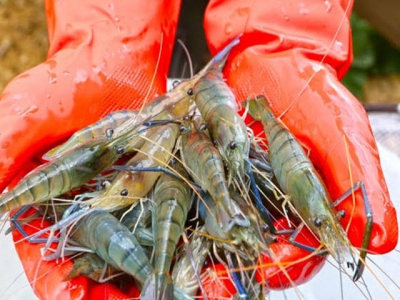Genomic breakthrough for freshwater prawns

The sequencing and assembly of the world’s first high-quality genome of giant freshwater prawn (M. rosenbergii) has now been completed.
Female giant freshwater prawns (M rosenbergii) perform better in aquaculture. Photo © Enzootic
The major factor that distinguishes the genome of the female shrimp from that of its male counterpart is the distinctive W chromosome. Despite the obvious importance of this chromosome, the sequences and encoding genes unique to this chromosome remained unknown until now. The incentive to study the genome of female shrimp derived from the dramatic performance advantages of farming all-female populations of shrimp.
The work has been undertaken by Enzootic, an animal biotechnology and genetics company, and NRGene, a leading provider of genomic big data analysis. Enzootic’s leading position in the commercialization of this novel mono-sex strategy led to the partnership with NRGene in a quest to learn more about the performance superiority of female shrimp and to enhance the breeding of the all-female broodstock.
“The preliminary study of this outstanding high-quality genome has already revealed dozens of new previously unknown putative W-specific genes, with a fascinating array of functional motifs that could shed light on the importance of the W chromosome and its potential impact on the performance of females,” said crustacean endocrinologist Prof Amir Sagi of Ben-Gurion University in the Negev and co-founder of Enzootic.
“Further research will be needed to reveal the role of these novel genes and how they regulate the physiology of females under mono-sex aquaculture conditions,” he added.
“Our collaboration with Enzootic on the assembly of the first high-quality, reference-level shrimp genome is part of NRGene’s strategy to support and enhance breeding of highly important animal protein agro-industries, such as shrimp and aquaculture, as a vital food source,” said Dr Gil Ronen, CEO of NRGene. “We work ceaselessly to continually improve our technology to have an ongoing, powerful, positive impact on the world food supply.”
The impact of the female shrimp genome assembly on shrimp production was eloquently expressed by Prof Xuxiong Huang, Vice Dean of the College of Fisheries and Life Science, Shanghai Ocean University.
“Farmed shrimp is an imperative protein source for many countries. In 2016, China alone produced around 3.3 million tonnes of marine and freshwater shrimp, representing about 50 percent of the global production. This newly assembled high-quality freshwater shrimp genome is an important addition to the advanced technological tools that will be used in coming years in the breeding of shrimp toward a more effective and sustainable shrimp farming industry,” he said.
“The freshwater shrimp industry today still predominantly relies on traditional, low-tech methodologies, which lag behind those of other more advanced livestock industries. With the addition of this genome and the introduction of mono-sex technologies, I believe this can promote this industry towards 21st century practices,” he added.
Related news
 A progressive approach to shrimp health management
A progressive approach to shrimp health management How water quality management, low stocking densities and the use of specialised feeds can consign the use of antibiotics in shrimp farming to history.
 Broodstock adds to RAS investments
Broodstock adds to RAS investments Seafood investor Broodstock Capital has acquired 50 perent of water treatment company NP Innovation, a leading supplier of water treatment technologies
 A seismic shift in shrimp farming
A seismic shift in shrimp farming Charoen Pokphands Foods (CPF) has announced plans to stop farming shrimp in outdoor facilities within the next five years.